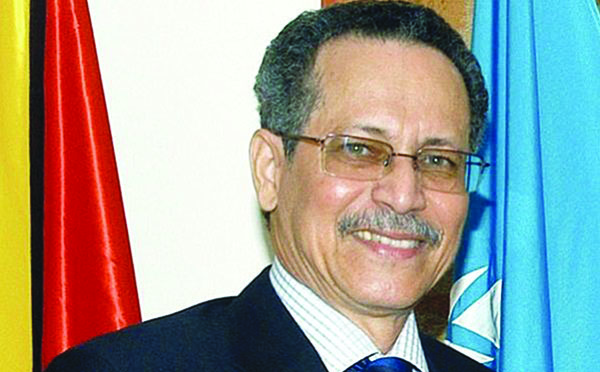BRUSSELS, Belgium November 30, 2016 (CMC) – The Secretary General of the African Caribbean and Pacific (ACP) Group, Dr. Patrick I. Gomes, says the grouping is on a course of uncharted waters in a changing global environment.
Addressing the 104th Session of the ACP Council of Ministers, which ends here, today, Gomes said that nonetheless, the 79-member countries “will not be daunted in our mission to craft the relevant policies and determine the best options to transform the prevailing challenges into opportunities for the shared prosperity of the ACP family of nations”.
The ACP meeting is being chaired by St. Kitts-Nevis International Trade, Industry, Tourism and Commerce Minister, Lindsay Grant.
Gomes said the ACP has had many successes and accomplishments in its 40-year history but, as is often noted, achievements pave the way for new and exciting opportunities to do better.
“It has been said that the ACP is now on a course of uncharted waters. We’re facing turbulence and the unpredictability of a multi-polar world as we look to a future with, and beyond, the longstanding partnership with the European Union,” he added.
The Guyana-born diplomat said that a new narrative and clearly-defined direction are needed to navigate these uncharted waters and confront the risks in the ACP’s journey to a post-Cotonou Agreement.
“The GPS is in our hands and we have to draw on our collective strengths to be the dynamic force and powerful voice for the future that we want for all the peoples of our societies,” he declared.
The Cotonou Agreement is a treaty between the European Union and the ACP, signed in June 2000 in Cotonou, Benin’s largest city. The accord ends in 2020.
Gomes told the meeting that a heightened political consciousness must shape the discussions and deliberations as the ACP “constantly bear in mind what are we striving for in the next 40 years? – next 10, next 5 years but starting now!”
He said he is confident that a deep clarity of purpose, policies and priorities is increasingly emerging that can drive the ACP to be distinctly recognised as an effective global player in serving the interests of its 79 member states.
But he acknowledged that the process of reinventing and repositioning the ACP demands discussions that are focused, concrete, wide-ranging and drawing on insights of all sections of society, including parliamentarians, representatives of civil society organisations and other non-state actors.
Gomes said that since the signing of the Cotonou Agreement, the ACP-EU partnership has realised a reasonable level of achievements over the last four decades.
He said there have been tremendous benefits in development finance through the European Development Fund (EDF) at national, regional, intra-ACP, AU and global levels, along with institutional strengthening and support of the administrative costs of the Secretariat.
In addition, substantial returns have been gained by development of enterprises and commodity trade on preferential terms for access to the EU market. But that is more of the past than the future.
But Gomes said while the volume and value of ACP’s exports, estimated at EURO90 billion (One Euro=US$1.29 cents) in 2015, have contributed to economic growth, creation of jobs and improved standards of living for ACP citizens, the next stage has to be diversification, value-addition, industrialisation and creative services.
“Hence going forward requires concerted action by a critical assessment of the relationship with Europe and the changes needed to ensure a rebalancing of mutual benefits for the ACP and the E,” he said, adding that he trusts this is the kind of partnership implied in the thinking of Stefano Manservisi, the new Director-General of the European Commission’s Directorate General for International Cooperation and Development (DEVCO), in his remarks.
“It seems to me that a precondition for a successful outcome in the negotiations of a post-Cotonou Agreement requires that we, as ACP, must be firmly united and consistently display the strength of numbers and clarity and unity of purpose on essential and fundamental principles in a new ACP-EU Agreement,” he stated.
Gomes said that there will be need for a consistent and convincing demonstration of unity by the ACP Group in the face of adverse policies and detrimental conditions that it could encounter.
In his address, Gomes also made reference to the financial situation confronting the ACP, noting that as an inter-governmental organisation, that is independent in policy-making and articulating a coherent agenda to advance the structural transformation of our economies, the need to be financially self-reliant is a sine qua non.
“Quite importantly, let us bear in mind that the image of an ACP, living mainly off EDF and EU taxpayers, mistaken and absolutely erroneous as it is, must be countered by demonstrating systematic efforts to end aid-dependency and become financially self-reliant,” Gomes said, adding that the ACP Secretariat intends to pursue diverse sources and has begun discussions with the OPEC Fund and the Islamic Development Bank to name two.
 Pride News Canada's Leader In African Canadian & Caribbean News, Views & Lifestyle
Pride News Canada's Leader In African Canadian & Caribbean News, Views & Lifestyle





